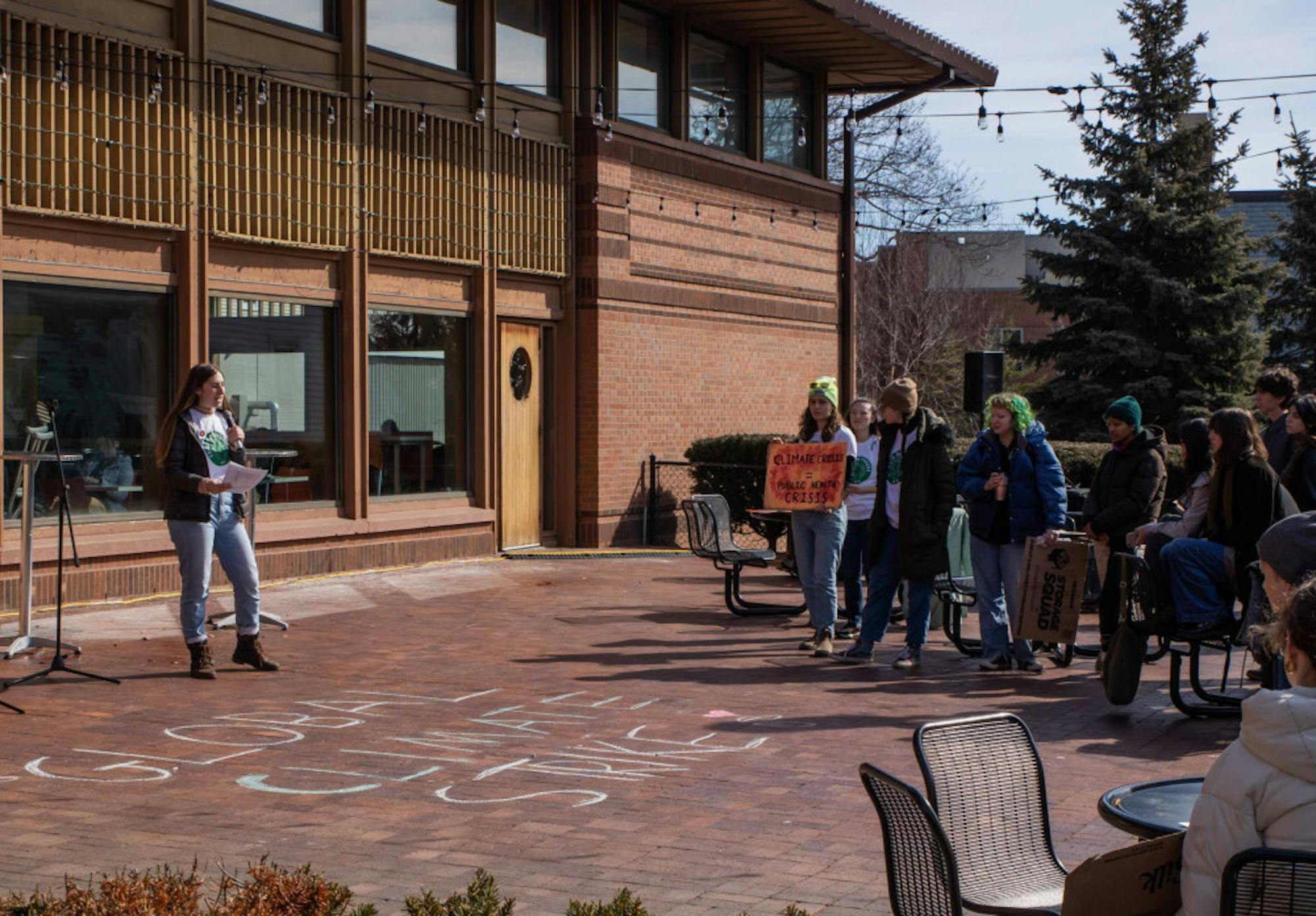Students gathered outside of the Mayer Campus Center on March 3, before the Global Climate Strike in Boston, to protest Tufts’ fossil fuel investments and rising global carbon emissions. Rachel Kyte, dean of The Fletcher School, spoke at the rally, offering support to protesters calling for divestment.
Kyte described a dark future for institutions tied to fossil fuel finance. She highlighted growing pressure on the university to ban such investments, of which Tufts currently holds an estimated $90 million.
“I’m glad that you are going to put pressure on this university to follow other universities around this issue. … This investment is not going to produce the kinds of equitable growth that we need going forward,” she said. “People are going to lose money. And the people who will lose money at the end of the day will normally be the taxpayers who will suffer as a result of public bailouts of private institutions that will ask for help.”
Her speech centered on fighting the climate emergency at every level of society. She called on governments, universities and students to reevaluate their role in the crisis and become leaders for change.
“We have a governor [of Massachusetts] and a mayor of Boston now fully aligned,” Kyte said. “You need to keep the pressure up domestically. The Inflation Reduction Act is an important move forward. It's not everything, we need much more than that. And you need to keep the pressure up in solidarity with people like you in every corner of the world. Because this has to work for everybody. There is no way we succeed in making this transition with just the 1% ending up better off than they were before.”
Artem Dinh, a Ukrainian and Vietnamese senior at Tufts, spoke to protesters about the influence of petropolitics in the ongoing conflict in Ukraine, condemning European countries for purchasing gas from Russia and, as a result, perpetually funding Russian aggression.
“Every single missile and the bullet that comes on Ukrainian soil and hits Ukrainian people is actually paid by European taxpayers’ money,” Dinh said. “How come? Well, because Europeans [pay] for gas and oil that they import from Russia. ... And all this money is being used to fund the Russian war regime in Syria, Georgia, Ukraine [and] Moldova.”
Dinh also touched on personal experiences with climate change in Vietnam.
“I’ve seen firsthand how rice paddies [are] being abandoned because of sea level rise,” Dinh said. “The sea level rises, people cannot grow rice anymore because it’s salted water. … And my city gets flooded. … Every year the flood gets worse.”
Shoshana Daly, another student who spoke at the protest, has been an organizer with Fridays for Future for two years. The nonprofit, which hosted the Boston Global Climate Strike, was founded by youth climate activist Greta Thunberg in 2018 and has since gained international recognition.
Daly accused the university of “greenwashing,” a practice of deceptive marketing to appear environmentally conscious.
“They hope that behind the sustainability department and environmental studies program that we won't be able to see that they continue to perpetuate a problem that they claim to try to change,” she said. “Today we are here to say that tomorrow is too late; universities, big corporations and politicians are treating climate change as if it is a problem of tomorrow. But it's not. It's here now.”
Julia Silberman, an organizer for Tufts Climate Action, criticized Tufts’ $90 million investment in fossil fuels.
“Fossil fuel divestment might have been a radical concept 10 years ago, but not anymore,” she said. “Institutions across the world have divested over $40 trillion from the fossil fuel industry. … We know that frontline communities, namely people of color and low income communities, have been impacted first and hardest by climate change. Meanwhile, the Tufts administration and trustees will continue in safety, using the university’s endowment to fund these injustices.”
Kyte was optimistic that much can be done to mitigate the effects of climate change.
“We don’t have time; we’ve handed you a mess,” she said. “We’re not going to leave you alone with this mess. … In this transition that we are going to live through for the next few decades — successfully, because we can if we put our minds to it — we will have to build justice into that transition. At the end point, we have to have a system that is more equitable than the one we have today.”
Following the demonstration outside the Campus Center, protestors made their way to downtown Boston to march for climate action.






